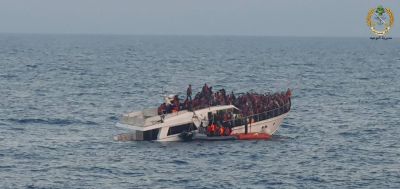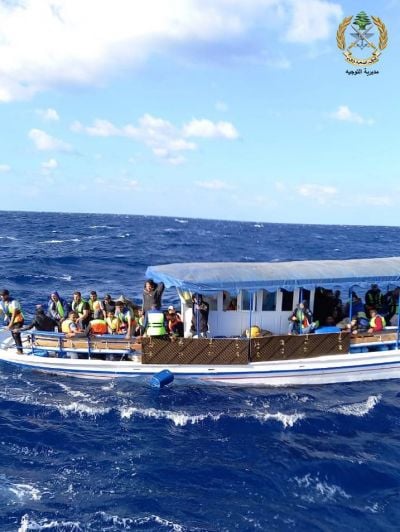A boat with would-be migrants six miles off the coast of Arida, Akkar. (Credit: Lebanese Army via Twitter)
Migrant crossings through the Mediterranean have reached unprecedented levels as increasingly organized smuggling gangs are producing makeshift boats more easily, the head of the European Union's border agency told AFP.
In the first four months of 2023, the number of crossings through the central Mediterranean soared to almost 300 percent of the same period last year, with almost 42,200 entries detected.
The number of would-be migrants undertaking treacherous journeys from Lebanon more than doubled in 2022 for the second year in a row, according to the United Nations Refugee Agency (UNHCR).
UNHCR reported that in the first nine months of 2022, 2,670 individuals “departed or attempted to depart irregularly from Lebanon” by boat, compared to the same period in 2021 when 1,137 individuals did the same.
"I have never seen this before," said Frontex — the European Border and Coast Guard Agency — chief Hans Leijtens in an interview with AFP, adding that the crossings through the route accounted for just over half the nearly 80,700 irregular entries into the EU so far this year.
"Especially from Tunisia, right now we see, compared with last year, it's a 1,100 percent growth," Leijtens said.
In a statement, Frontex said the level of crossings across the central Mediterranean is the highest since the agency began collecting data in 2009.
The steep rise, according to Leijtens, has to do with the change in the modus operandi of the human traffickers — and the lower price of a single crossing.
"They're using small metal makeshift boats that can be produced at the beach within one day, 24 hours, which will cost around €1,000 ($1,090)," Leijtens said.
"The lower prices mean they need to have larger volumes. So there's a reason for them to push more. So that may also be an explanation for the numbers right now."
Leijtens said smugglers were becoming more organized and competing with each other.
'A real dilemma'
In at least one case, he said, a boat was sunk by competitors.
Rights groups, including Human Rights Watch, have accused Frontex of being complicit in abuses of migrants in Libya by collaborating with the Libyan coast guard to intercept boats.
Leijtens said the agency did not cooperate in any way with Libya and denied claims that it abets pushbacks by informing them of the locations of boats in European search and rescue areas.
"What we do is only when a vessel is in distress, we disperse the Mayday call and that Mayday call is also received by the Libyan and Tunisian authorities," he said.
"If the coordination center agreed that it will be Libyan Coast Guard doing the search and rescue, they will sail and they will save people's lives. Pushback is something completely different," Leijtens told AFP.
"We are — and that sounds a bit harsh — indifferent on who's saving a life, as long as they are saved," he added.
"Of course, you hope that they don't end up in the camps that the UN has described in their reports. And that is for us professionally, a real dilemma."
A UN fact-finding mission has warned that migrants stuck in Libya while trying to reach Europe are being systematically tortured and forced into sexual slavery.
Preventing pushbacks
Following the resignation of his predecessor, Fabrice Leggeri, the new Frontex boss vowed in January to restore trust in the organization and stop pushbacks of migrants at the EU's borders.
He pledged a revamp of the organization, previously shaken by claims of complicity in human rights violations.
But, two months after taking office, Leijtens said he "cannot assure" the illegal pushbacks of migrants are not taking place in the EU.
"Of course, I never can prevent things from happening," Leijtens said.
"I can create conditions, first of all, that we know about the moment they happen, that we try to be there to prevent them from happening. We try to educate our people," he added.
Leijtens said he stayed in touch with non-profits that previously denounced Frontex actions and tried to use his leverage in talks with EU member states accused of allowing the pushbacks.
Asked about the role of President Vladimir Putin's Russia in the destabilizing situation on EU borders, Leijtens said: "For sure it's in their playbook, and whether they use it or not, it's up to them. They have the capabilities to do it."
"I can't look in the head of Mr. Putin or others whether he will but it's in their playbook for sure," Leijtens said.
Migrant crossings through the Mediterranean have reached unprecedented levels as increasingly organized smuggling gangs are producing makeshift boats more easily, the head of the European Union's border agency told AFP.
In the first four months of 2023, the number of crossings through the central Mediterranean soared to almost 300 percent of the same...

